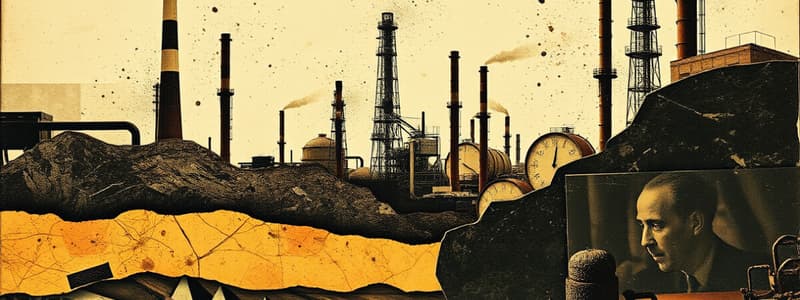Podcast
Questions and Answers
What is crude oil?
What is crude oil?
Hydrocarbon - a compound of hydrogen and carbon.
What is the purpose of the refining process in crude oil?
What is the purpose of the refining process in crude oil?
To remove or reduce the unwanted elements and particles.
Name the three basic groups of crude oil.
Name the three basic groups of crude oil.
Paraffins, Naphthenes, Aromatics.
What determines the characteristics of a particular type of crude oil?
What determines the characteristics of a particular type of crude oil?
What products are obtained based upon crude oil's characteristics?
What products are obtained based upon crude oil's characteristics?
What does the refining process achieve?
What does the refining process achieve?
What is the basis of the refining process? What does it involve?
What is the basis of the refining process? What does it involve?
List the different refining processes.
List the different refining processes.
How do the various refining processes differ?
How do the various refining processes differ?
List typical oil distillates starting with those with lower boiling points.
List typical oil distillates starting with those with lower boiling points.
Name typical oil residuals.
Name typical oil residuals.
What is a fractionation tower?
What is a fractionation tower?
What is a catalyst?
What is a catalyst?
What is catalytic cracking?
What is catalytic cracking?
What are catalytic fines and why are they a problem?
What are catalytic fines and why are they a problem?
What is meant by the fuel physical properties?
What is meant by the fuel physical properties?
What are the fuel chemical properties?
What are the fuel chemical properties?
What's ISO 8217?
What's ISO 8217?
What are the four grades of distillate fuel?
What are the four grades of distillate fuel?
List the fuel properties described in the ISO 8217 notes.
List the fuel properties described in the ISO 8217 notes.
List the possible hazards on seamen from oils used on ships as described in MSN 1521.
List the possible hazards on seamen from oils used on ships as described in MSN 1521.
Where can one find advice and information on health and safety onboard ships?
Where can one find advice and information on health and safety onboard ships?
Who should provide information about the use of particular products and the necessary precautions for safety?
Who should provide information about the use of particular products and the necessary precautions for safety?
What is the significance of ambient conditions with regard to engine performance?
What is the significance of ambient conditions with regard to engine performance?
List four parameters of ambient conditions.
List four parameters of ambient conditions.
Flashcards are hidden until you start studying
Study Notes
Crude Oil Overview
- Crude oil is a hydrocarbon, composed of hydrogen and carbon.
- The refining process aims to eliminate unwanted elements and particles from crude oil.
Types of Crude Oil
- Crude oil is classified into three groups: paraffins, naphthenes, and aromatics.
- Characteristics of crude oil, such as boiling temperature, viscosity, and density, are determined by its atomic structure.
Products from Crude Oil
- Crude oil can be processed into various products including fuel, lubricants, and solvents.
Refining Process
- The refining process separates crude oil into different fractions or grades via distillation, which involves evaporation and condensation.
- Refining methods include primary processes (e.g., straight run process) and secondary processes such as thermal cracking, vacuum distillation, visbreaking, and catalytic cracking.
Distillation and Residuals
- Distillation produces typical oil distillates ranging from propane to lubricating base oil, each with a specific boiling point.
- Common oil residuals include heavy oil, bitumen, tar, and carbon black.
Fractionation Tower
- A fractionation tower is utilized to heat crude oil, where vapors are boiled off and condensed at various temperatures.
Catalysts and Catalytic Cracking
- A catalyst is a substance that accelerates chemical processes without undergoing change itself.
- Catalytic cracking employs silica-alumina based catalysts and heat to produce lighter fractions.
Catalytic Fines
- Catalytic fines, abrasive particles from catalytic cracking, can damage fuel injectors and other engine components.
Fuel Properties
- Fuel physical properties influence safe handling, storage, and effective delivery to engine combustion chambers.
- Fuel chemical properties determine energy content, combustion by-products, and environmental impacts.
ISO 8217 Standard
- ISO 8217 outlines international fuel types and grades, providing guidelines on characteristics and testing limits for each grade.
Distillate Fuel Grades
- The four grades of distillate fuel are DMX, DMA, DMB, and DMC.
Fuel Specifications
- ISO 8217 details various fuel properties including health and safety considerations, density, flash point, and viscosity among others.
Health Hazards
- Residual fuel oil and used engine oil may contain carcinogenic poly aromatic hydrocarbons and can cause skin issues upon contact.
Safety Information
- The Code of Safe Working Practices for Merchant Seamen provides key health and safety information onboard ships.
- Suppliers must provide safety information and precautions as mandated by the Health and Safety at Work Act 1974 and Consumer Protection Act 1987.
Engine Performance
- Ambient conditions affect engine-specific fuel consumption and performance.
- Key ambient condition parameters include inlet air temperature, seawater temperature, barometric pressure, and humidity.
Studying That Suits You
Use AI to generate personalized quizzes and flashcards to suit your learning preferences.




